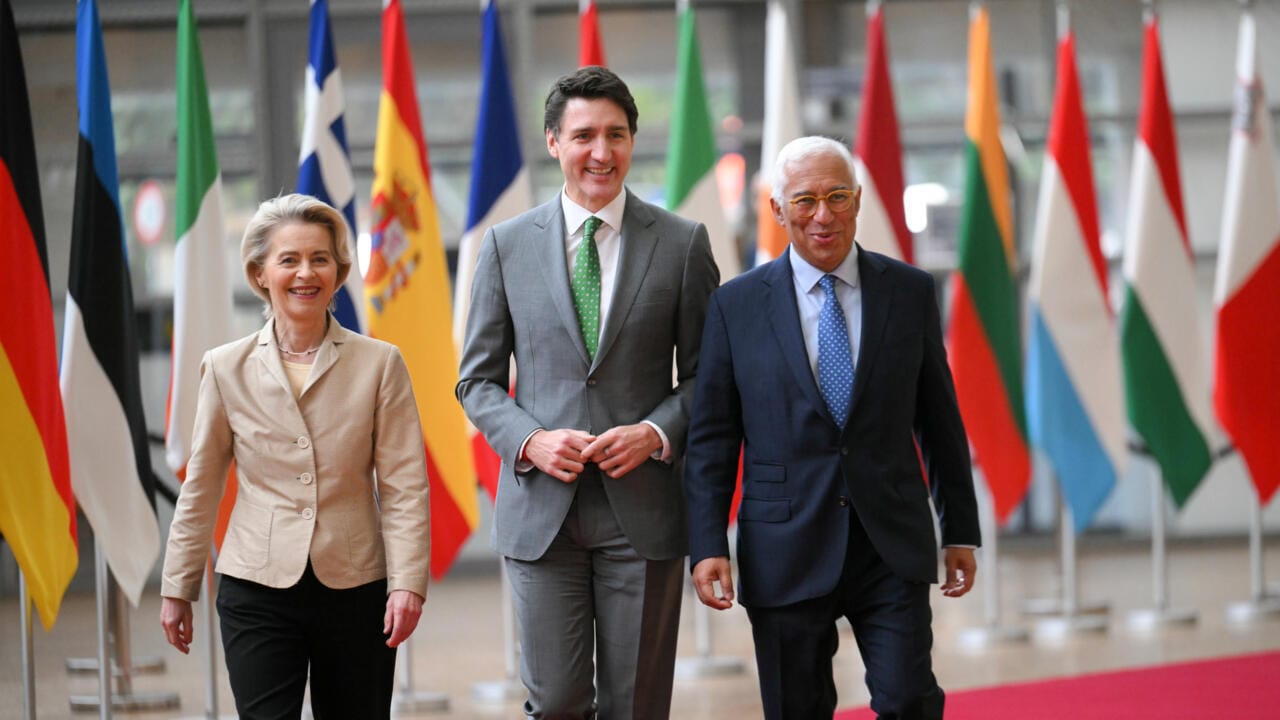- The Daily Yield
- Posts
- 🌾 Farm Smart
🌾 Farm Smart
A monopoly in the making?

Good morning! It's Monday, and The Daily Yield is here with your essential ag news. We're covering business movement, ag-tech, and adding a touch of wit.
Before diving back into emails and spreadsheets this afternoon, take a minute to get ahead. Got a tip or feedback? Hit reply and let us know!
Let’s get into it. ☕️
— TDY Team
MARKETS
Grains and Oilseeds:
Corn: March corn closed at $4.96¼ per bushel, up 2¾ cents.
Soybeans: March soybeans ended at $10.36 per bushel, a 6-cent increase but still down from earlier in the week.
Wheat: March wheat jumped to $6.00 per bushel, up 22¼ cents.
Soybean Oil: March soybean oil settled at $46.07 cents per pound, dipping 18 points. A slight slip, but still keeping things cooking.
Livestock:
Live Cattle: April live cattle closed at $194.25, down $2.27. Seems the cattle are taking a breather after a bullish run.
Energy:
Crude Oil: March crude oil finished at $70.74 per barrel, a decrease of 55 cents. Despite geopolitical tensions, oil prices slipped for the fourth consecutive week.
Metals:
Gold: April gold settled at $2,897.20 per ounce, down $48.20.
Indices:
S&P 500: Closed at $6,114.63, virtually unchanged.
Dow Jones Industrial Average: Ended at $44,546.08, down 0.4%. A slight dip, but nothing to lose sleep over.
Nasdaq Composite: Rose by 0.4% to $20,026.77 as tech stocks continue to buzz.
Cryptocurrency:
Bitcoin: Increased by 0.97%, reaching $97,215.64.
Overall, the week showcased a mix of modest gains and slight retreats across various commodities and indices. As always, the markets keep us on our toes—much like trying to herd cats.
*All prices are from market close Friday February 14th, 2025. Information displayed here within is not financial advice and The Daily Yield holds no responsibility for investment decisions made using this information.
AGRIBUSINESS
A grain giant or monopoly in the making?

Bunge and Viterra deal creating drama.
The Canadian government has given the green light (with conditions) to the $34 billion merger between Bunge and Viterra, setting the stage for a new grain giant to rival ADM and Cargill. To keep things somewhat competitive, Bunge has been ordered to sell off six grain elevators in Western Canada and commit C$520 million in investments over the next five years. Meanwhile, to prevent any shady grain dealings, Bunge’s influence over its minority stake in G3 (a Saudi-owned grain company) will be heavily restricted.
Despite these guardrails, Canadian farmers aren’t exactly thrilled. The National Farmers Union warns that the merger will give the new entity control of about 40% of Canada’s grain market, potentially limiting farmer options and driving down crop prices. Regulators insist this won’t lead to a grain monopoly showdown, but skepticism remains. The deal, which has been in the works since 2023, is set to finalize in early 2025, with Bunge-Viterra eyeing the booming biofuel market for soybean and canola oil. Farmers, however, are keeping a close watch—because fewer buyers usually means fewer bidding wars, and that’s never great for the guy growing the grain.
Ag down unda’ is attracting international investors

Australia is making a name for itself in ag-tech, proving that when the land throws heatwaves, droughts, and wild kangaroos at you, you innovate. With almost no farming subsidies (just 2% compared to the U.S.'s 10% and the EU’s cushy 20%), Aussie farmers don’t have government safety nets—they have AI-powered tractors, carbon-capturing fungi, and enough sensors to make NASA jealous. The country’s $100 billion ag industry is thriving, and investors are eating it up like a well-marbled Wagyu steak. Loam Bio, for example, went from a humble New South Wales startup to an international soil-health powerhouse, attracting big-name investors like Marc Benioff and Tobi Lütke.
Despite global funding for ag-tech taking a nosedive, Australia’s poured in $3 billion in 2024 alone, making it a prime destination for U.S. and Asian investors hunting for the next big thing in farm innovation. With the government pushing high-tech farming over old-school mining, the country is positioning itself as the Silicon Valley of Agriculture—but with more sunburn and fewer overpriced lattes. Whether it’s AI, robotics, or fungi-based soil magic, Aussie farmers are proving that necessity isn’t just the mother of invention—it’s also the mother of really smart, really profitable farming tech.
Cash on the crop for Canadian innovation

Minister of Agriculture and Agri-Food, Lawrence MacAulay.
In a move to make farming as cutting-edge as it is down-to-earth, Minister Lawrence MacAulay has unveiled over $7.2 million in funding for four trailblazing ag-tech projects under the AgriInnovate Program. This initiative, part of the Sustainable Canadian Agricultural Partnership, aims to sprinkle some tech-savvy magic across Canada's agricultural landscape.
Leading the pack is CRO Quail Farms Inc. in Ontario, pocketing $1.6 million to become North America's quail-production trendsetter with automated systems that tackle labor shortages and trim costs. Meanwhile, KSM Inc. in Quebec is set to revolutionize fertilizer production with a $5 million boost, crafting eco-friendly fertilizers that promise to keep both crops and the planet happy. Not to be outdone, Solution Aleop Inc. is receiving $371,250 to expand its digital tool, Aleop, helping farmers ditch paperwork for real-time efficiency. And Axceta Inc. is getting $255,353 to bring ultrasound tech to feed silos, ensuring livestock dine with precision.
"By supporting these impressive and innovative projects, we're giving our farmers the tools they need to lead in the industry.” “Keeping the sector strong and sustainable for the long haul."
AG-TECH
Looking for ag-tech to invest in?

Canada's agri-food-tech sector is like a promising seedling in need of more sunlight—specifically, the warm glow of private investment. A recent report from the Canadian Food Innovation Network reveals that between 2018 and 2024, Canadian agri-food-tech startups attracted $1.6 billion in funding. While this might sound impressive, it's a mere sprout compared to the $8.8 billion in the UK and a towering $86.6 billion in the US. The kicker? A hefty 30% of Canada's funding comes from public grants, dwarfing the UK's 8% and the US's 5%. This reliance on government support highlights a "venture capital gap" that's leaving our startups thirsting for private dollars.
Early-stage Canadian startups benefit from incubators, accelerators, and lower entry costs, but face funding challenges as they grow. Series A and B rounds in Canada are about half the size of those in the UK and US, and by Series C, American startups receive three times more funding. This shortfall limits Canadian innovators' ability to scale, build supply chains, and navigate regulations. Without increased private investment, the agri-food-tech sector may struggle to compete globally.
The sector is ripe with opportunities, especially in areas like bio-based crop protections, agri-fin-tech, and supply chain innovations. Programs like the THRIVE Canada Accelerator are actively nurturing these startups, offering mentorship and connecting them with investors. By getting involved now, you can support sustainable agriculture and potentially reap substantial returns as these companies scale and succeed.
AG BITES
Covering the field
🤖 Collaborative Robots (Cobots) Gaining Traction in Agriculture: Once the stuff of science fiction—now as common as tractors in modern farming, cobots are tackling labor shortages and rising costs head-on. With 70% of growers investing in automation by 2022, these robots are proving their worth, from precision sprayers adding $300 of value per acre to pruning automation saving up to $800 per acre. In Canada, the government is backing projects like Exonetik Inc.'s low-cost farm robots and the Agricultural Robotics Centre in Ontario, ensuring that Canadian farmers stay ahead. Investing in cobots now means greater efficiency, lower expenses, and a future where farmers work smarter, not harder. By investing in cobots now, Canadian farmers can boost efficiency, reduce long-term expenses, and ensure they're not left in the technological dust.
🐣 U.S. Egg Industry Adopts Male Chick Identification Technology: To address the ethical and economic issues of culling male chicks, the U.S. egg industry is implementing technology that identifies the sex of embryos before hatching. Machines like "Cheggy" use sensors to determine feather color, allowing male embryos to be processed before hatching. This advancement aims to eliminate the annual culling of approximately 350 million male chicks in the U.S.
🇨🇳 China Advances Agricultural Biotechnology: China has unveiled a five-year plan (2024-2028) to enhance its agricultural biotechnology capabilities. The initiative focuses on developing gene-editing tools and new crop varieties, including wheat, corn, soybeans, and rapeseed, aiming to boost food security and reduce reliance on imports. The plan also emphasizes breeding livestock with improved reproductive capacities and disease resistance.
🚜 Electric and Autonomous Tractors: The introduction of electric and self-driving tractors marks a significant shift towards sustainable farming practices in Canada. Notably, the Monarch MK-V, a fully electric and autonomous tractor, has been deployed in British Columbia's orchards and vineyards. This 70-horsepower machine operates emission-free and utilizes AI-driven automation to enhance efficiency. Similarly, John Deere unveiled autonomous machinery at CES 2025, featuring advanced computer vision and AI to navigate various agricultural environments.
WORLD NEWS
Ukraine sidestepped

Putin and Trump enter negotiations over Ukraine war.
In a plot twist worthy of a political thriller, the U.S. and Russia have embarked on peace talks in Saudi Arabia to address the ongoing conflict in Ukraine. The catch? They've conveniently "forgotten" to invite Ukraine and their European pals to the negotiation table. Ukrainian President Volodymyr Zelenskyy, understandably miffed, has declared that any backroom deals made without Ukraine's input aren't worth the paper they're printed on. Meanwhile, European leaders are scrambling, with French President Emmanuel Macron calling for an emergency summit to figure out how they ended up on the sidelines of a crisis in their own backyard.
Canada, a steadfast supporter of Ukraine, provides economic aid and military assistance. Despite major powers acting independently, Canada, through Foreign Affairs Minister Mélanie Joly, stresses that any peace deal must respect Ukraine's sovereignty and include its voice. While global powers engage in high-stakes diplomacy, Canada remains a loyal ally, advocating for true peace by involving Ukraine.
Canada flirts with the EU

Canada and EU seek comfort in numbers.
We’re not sure even the most imaginative maple syrup enthusiasts could have predicted this one, rumors have been swirling about Canada joining the European Union (EU). While the idea of poutine and croissants sharing the same economic table is intriguing, the reality is a bit more grounded. Canada isn't packing its bags for Brussels just yet. Instead, it's strengthening its existing ties with the EU, especially in light of recent trade tensions with the United States. Trade Minister Mary Ng's recent visit to Brussels underscores this commitment, focusing on boosting trade and collaborating on critical minerals. Since the Comprehensive Economic and Trade Agreement (CETA) came into force in 2017, trade between Canada and the EU has increased by 65%, proving that distance is no barrier to a fruitful partnership.
For Canadians, this means more opportunities to enjoy European goods and services without the hefty price tag, and vice versa. While you won't need to brush up on your French or German for citizenship tests anytime soon, you might notice a few more European delicacies on your local store shelves. So, while full EU membership isn't on the horizon, Canada's dance with Europe continues, ensuring that both parties benefit from a harmonious economic waltz.
BRAIN ACTIVATION
Ag-Brain Teaser: "Farmyard Riddle"
🔍 Can you crack this agricultural riddle?
I grow tall, but I'm not a tree.
I'm harvested, but I'm not a fish.
You can pop me, but I'm not a balloon.
What am I?
One today is worth two tomorrows; what I am to be, I am now becoming.
— Anonymous
SPREAD THE YIELD
Enjoying The Daily Yield? Don’t keep the good stuff to yourself! Share this newsletter with fellow farmers, ag insiders, and anyone who loves staying ahead of the curve.
🐦 Tweet about us (because even ag news deserves some social love!)
or
The more we grow, the better we get—just like a well-fertilized crop! 🚜💨
Riddle answer: Corn 🌽
Reply